Burning Forests Can Help Us Think
Some cautious reflections on the fires burning in western forests
This weekend when I looked out my windows, I could not see the Olympic Mountains or Skagit Bay. I could barely see the line of trees that mark the Skagit River’s south fork just two miles away. Smoke had blown west and settled in the valley. We are lucky here. The air quality, while making it hard to see, could be much worse, and the flames are far from us, which is not true of many people.
Wildfires are inescapable now.
I have spent a lot of time reading and thinking about wildfires (such as this and this) in my career, but, as with so many things academic, that thinking has often been narrow and, well, academic. However, a fire currently is burning at H. J. Andrews Experimental Forest where I spent two weeks in June and that I wrote about in Taking Bearings here and here. Despite only those two weeks there, this fire – Lookout Fire – feels more personal than most fires that cross the news pages and screens. I wanted to spend The Wild Card this week musing about this. Read on!
My Time in the Andrews
A quick refresher. I spent two weeks at the Andrews, hiking around and thinking about old-growth forest history and ecology. I talked with scientists and photographers and learned about the history. What made the most impact, though, were hours on my feet looking at and contemplating trees – feeling their bark, smelling their scents, sensing their heft.
On my final longish hike, I headed to Lookout Mountain. I got a little lost, an experience that is good for prompting attention. When I reached the ridgetop, I could see many mountains in the distance but more interesting was the patchwork visible inside the Andrews forest, showing coarse results of experiments in cutting from decades ago. The marks on the land are good reminders of this forest’s purpose and that actions have long-term visible and ecological effects.
Because getting to the ridgetop took time and energy, I enjoyed lingering over lunch, listening to the birds and scanning the landscape.
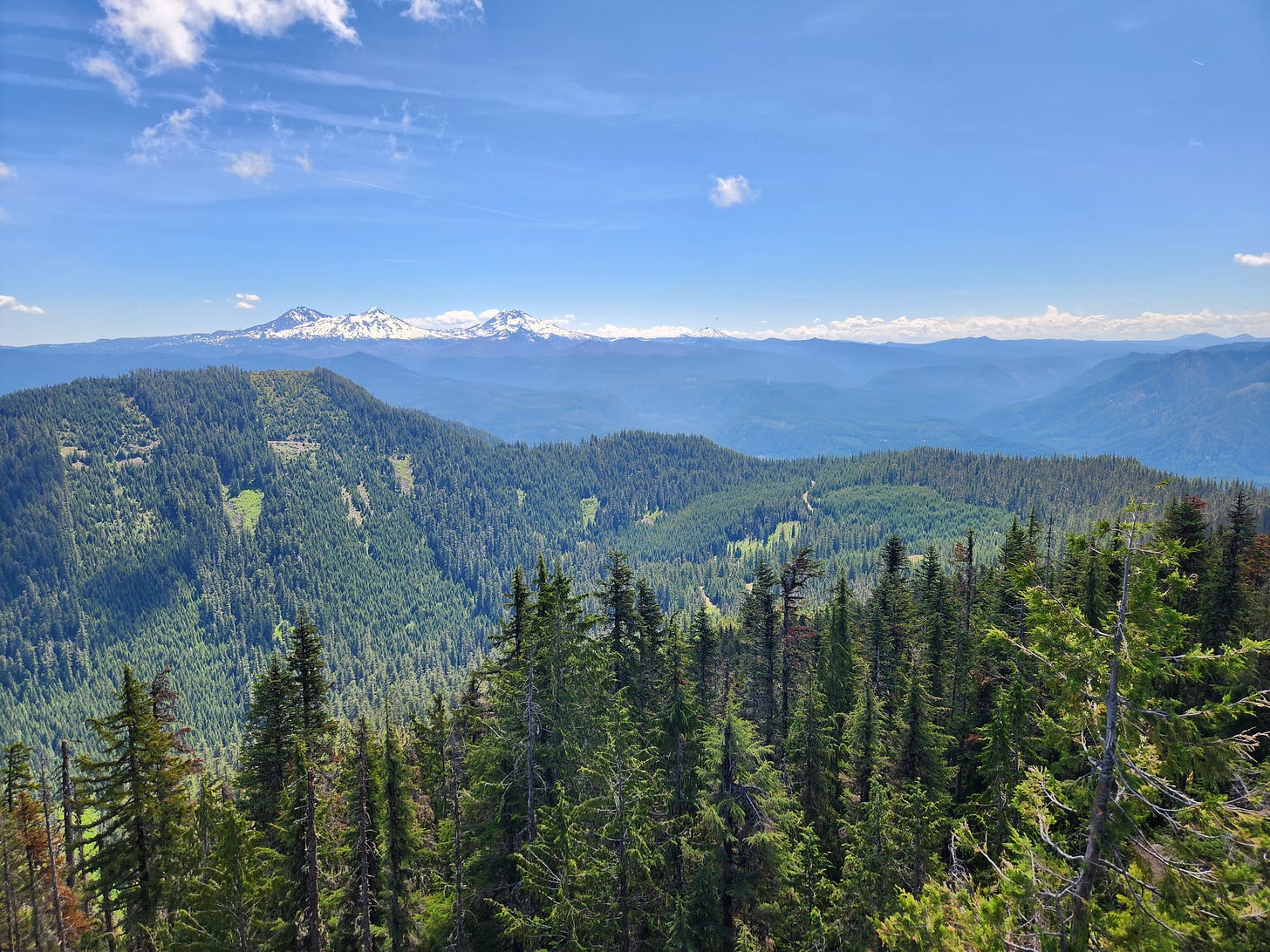
The Lookout Fire
Very near that spot (about two miles if I’m reading the maps correctly), on August 5, a lightning strike started a fire. Within two days, it grew to 2.5 acres. After 10 days, it covered nearly 3,000 acres. Today, on August 23, it’s more than 13,000 acres, 6% contained. (Official updates can be followed here.)
The fire started in the southeastern part of the Andrews and has spread mostly northeastern and southwestern. Of course, fire respects no boundaries, so it crept and leaped across the Andrews borders into neighboring national forest land (and, I’m guessing, some private forests, too.) Close readers or Oregonians with good memories will realize this is very near the 2020 Holiday Farm Fire that topped out at 173,000 acres. People living there have had a rough start to the decade.
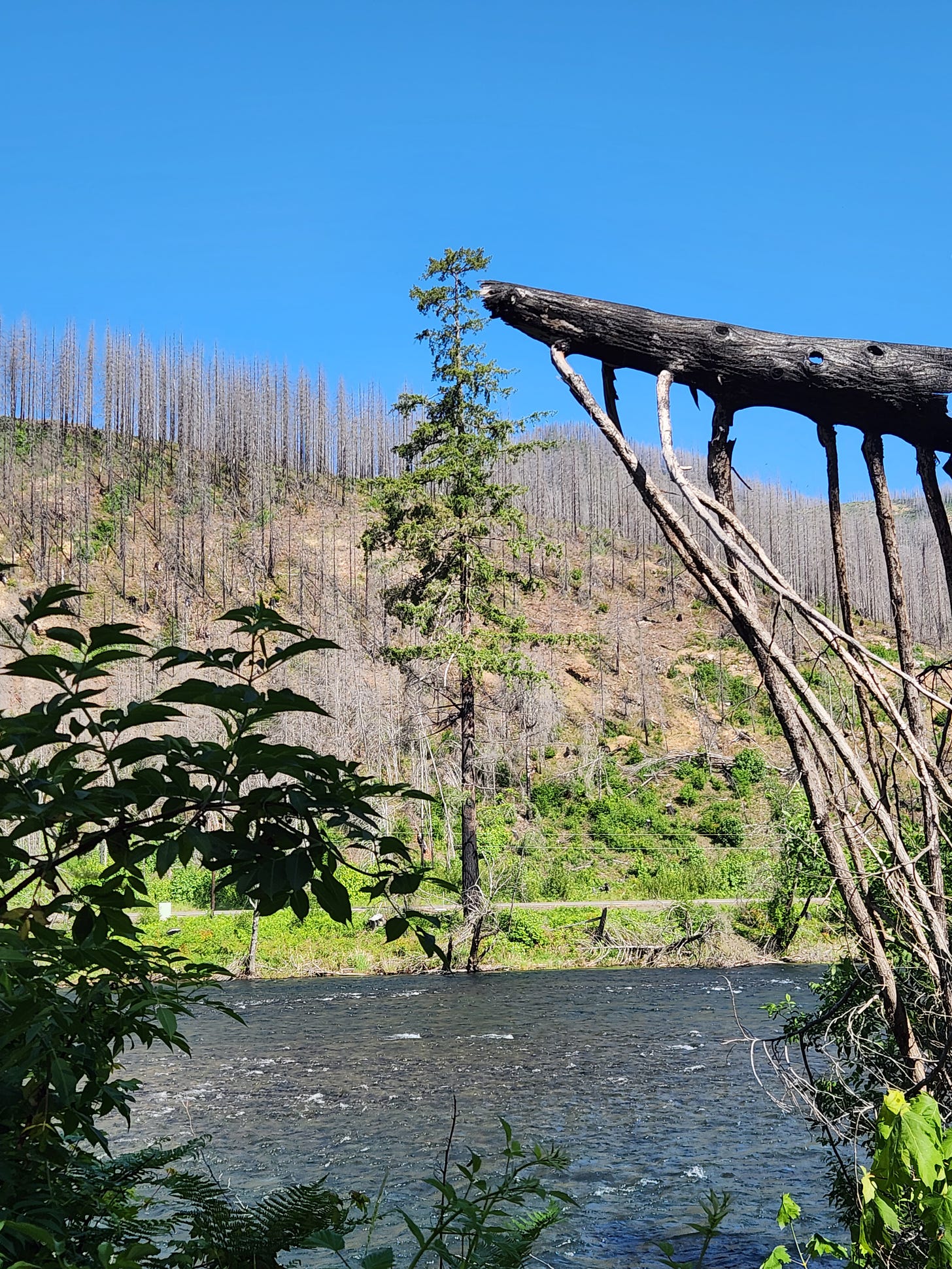
Personal Scale
I’m a cross of fatalistic and realistic when it comes to fires or similar so-called natural disasters. I assume they will happen and typically do not connect with many emotions. And that’s the case here to a degree.
Dry trees burn. Logging policies and practices, as well as climate conditions guarantee that. I don’t wish for them, but accepting them seems generally wise to me – all the while trying to understand why and support policies and practices that seem best designed to produce outcomes I want.
I accept this fire, too, but it hits differently. It hits differently because a little more than two months ago I sat on a rock that today is undoubtedly covered in a layer of ash. I looked across a green landscape that, today, is heavy with smoke. When it clears, brown and red will compete with – and overwhelm – the green. I find it harder to celebrate or be neutral. It’s harder to hold a “realistic” view, when it’s a view you know.
Policy Scale
But I’m not angry or sad, exactly, either. People have evacuated. For the moment, the experimental headquarters seems reasonably safe (although a major change in the wind could overwhelm the 1000+ firefighters and defensive efforts, I suppose). Researchers whose study plots were in the burned area will have to adjust their projects, and I feel for them.
And I think about policy and practices, too. People stopped setting fires. People and agencies put out fires as fast as possible. This changed our forests. Every forest is different, so each one responds to this new fire regime in distinct ways. But generally, these decisions and actions have piled up over many decades and have made forests more vulnerable.
Logging policy has changed, too. At the Andrews (and elsewhere) a lot of science was done that helped create policies that sharply reduced logging in old-growth forests. Critics sometimes argue that if we just logged more, we’d not have these fire problems. (This ignores the fact that logged lands burn more often.) I struggle to imagine in our current nation a policy ambitious enough to transform the situation on the necessary scale.
Ecological Scale
And I try to think ecologically, even though I don’t know nearly enough. What I mean by this is I think about the burned areas I saw when I was in the Andrews in June. I hiked through the edge that had been nipped by that 2020 fire. And I found plenty of other evidence of fire visiting the forest. Charred stumps and bark were the most common signs.
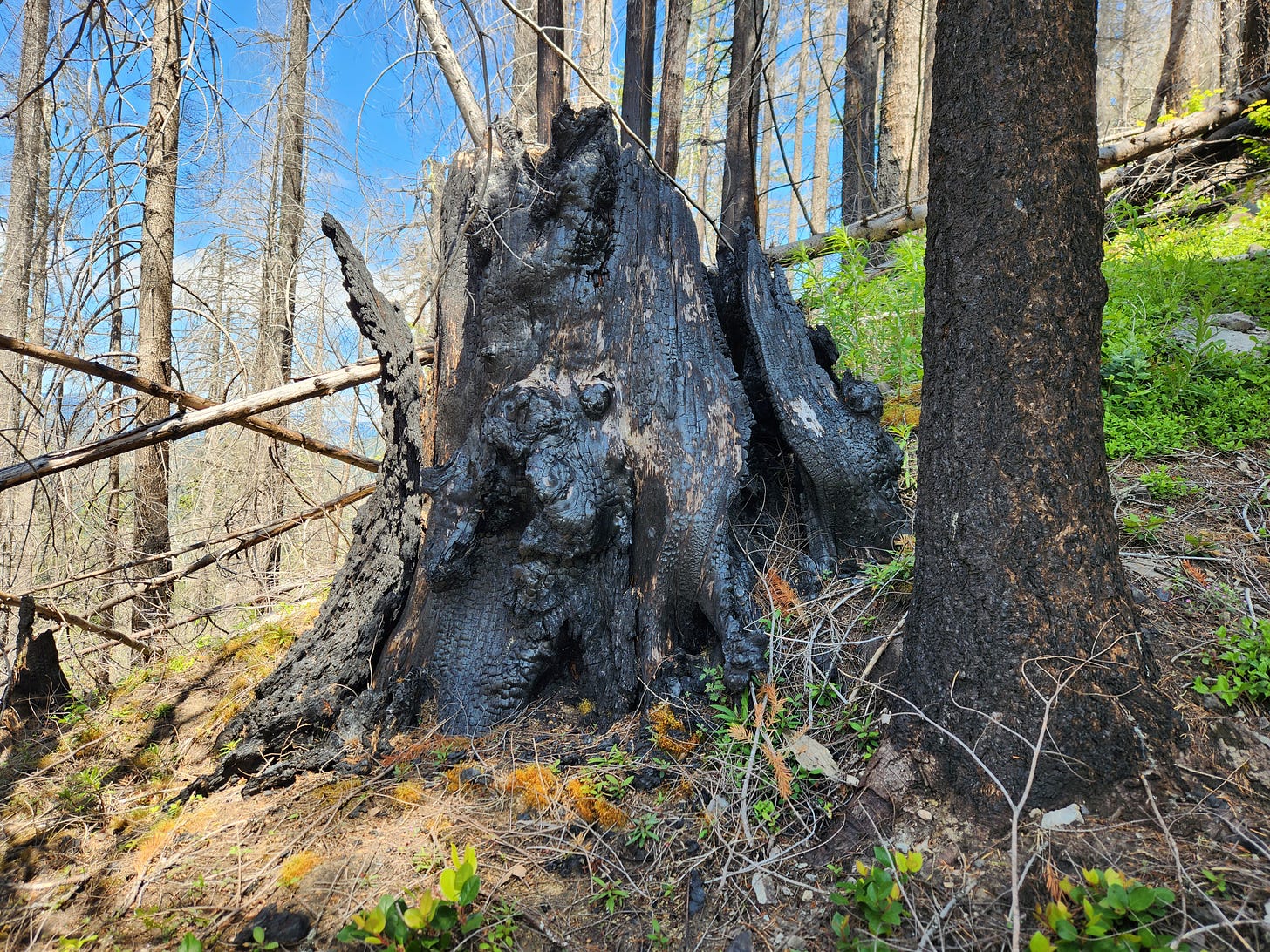
The fire is burning, and trees will stop growing because of it. Rocks will slide, eventually mud may slip. Streams might reroute. But “destroyed” is a word to use lightly, isn’t it? The Andrews isn’t destroyed. The forests aren’t destroyed. We will witness nature do what it does. Change. Evolve. Persist.
It may not be planned – a good reminder of contingency in the world. Or desirable. And it may yet take human lives and destroy property, and that would be genuinely tragic. Yet I wonder what happens if we try to focus just ecologically. Can this help us think and reframe our relationships and ideas about the environment? Can fire help us acknowledge the mere fact of change? We might not embrace fires, but maybe we could stop holding in our heads images of places as unchanging, which increases our distress when they change.
This acceptance isn’t easy and can too easily translate into passivity, which would be a bad outcome.
Nature is often a source of inspiration for its breathtaking beauty and dazzling connectedness. Maybe it could also be a source of inspiration for its unpredictability, its constant morphing, its ubiquitous surprises. It is more like us than we like to remember. It is us; we are it.
Maybe it is too early, while flames still spread, to think about these things. But I think we must think about them at some point so we are prepared for the coming world.
Final Words
Late last week, I published an essay about the 1908 Conference of Governors, an interesting moment in conservation history. It first appeared in Zocalo Public Square (a place that publishes great things and sponsors terrific public programs) and then was repackaged in the Boston Globe, an unexpected treat.
As always, you can find my books, and books where some of my work is included, at my Bookshop affiliate page (where, if you order, I get a small benefit).
Taking Bearings next week
The cycle begins again next week with The Classroom. My plan, subject to change, is to write something about about national scenic trails, which may begin a couple connected posts. Stay tuned!



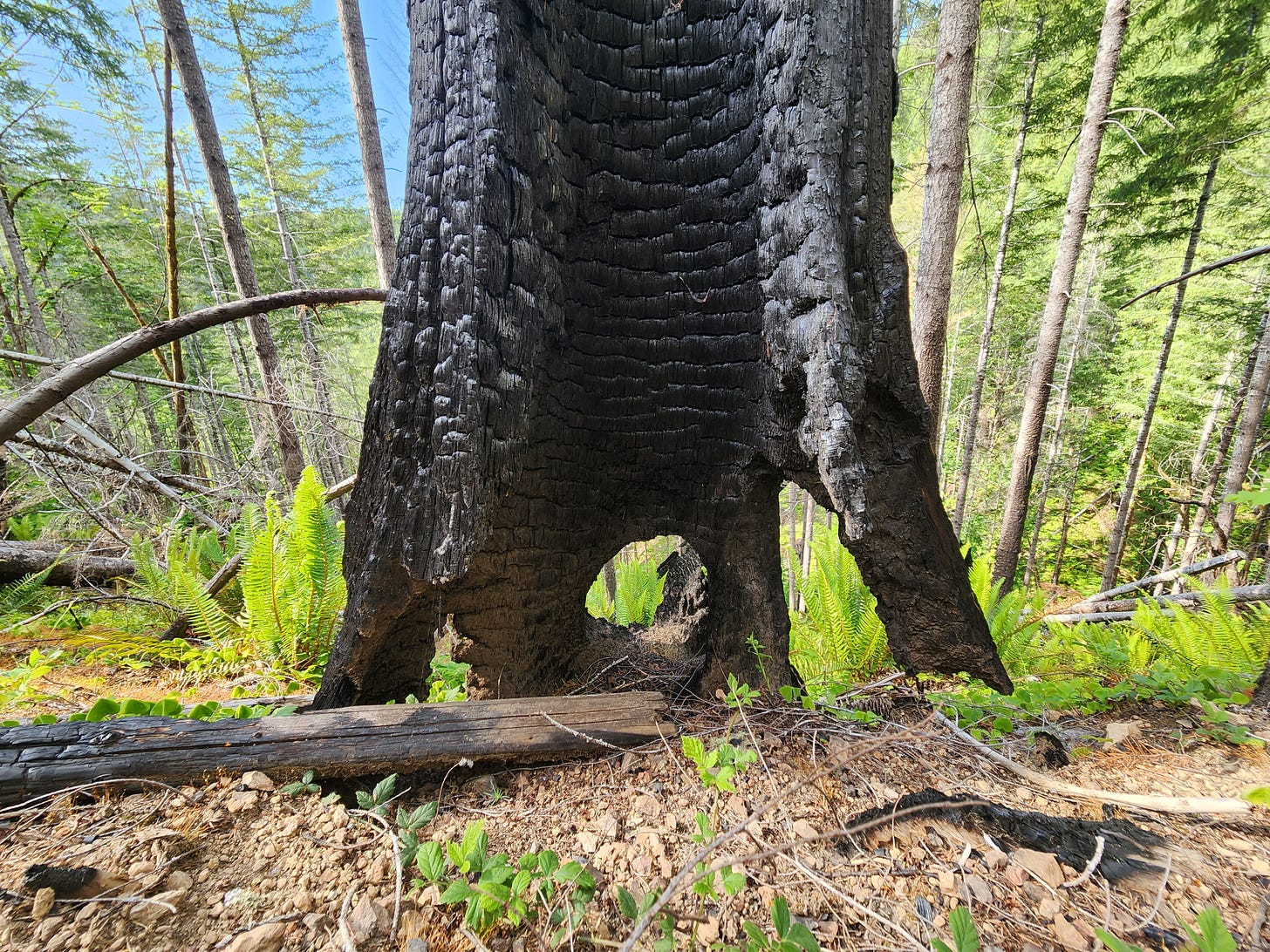

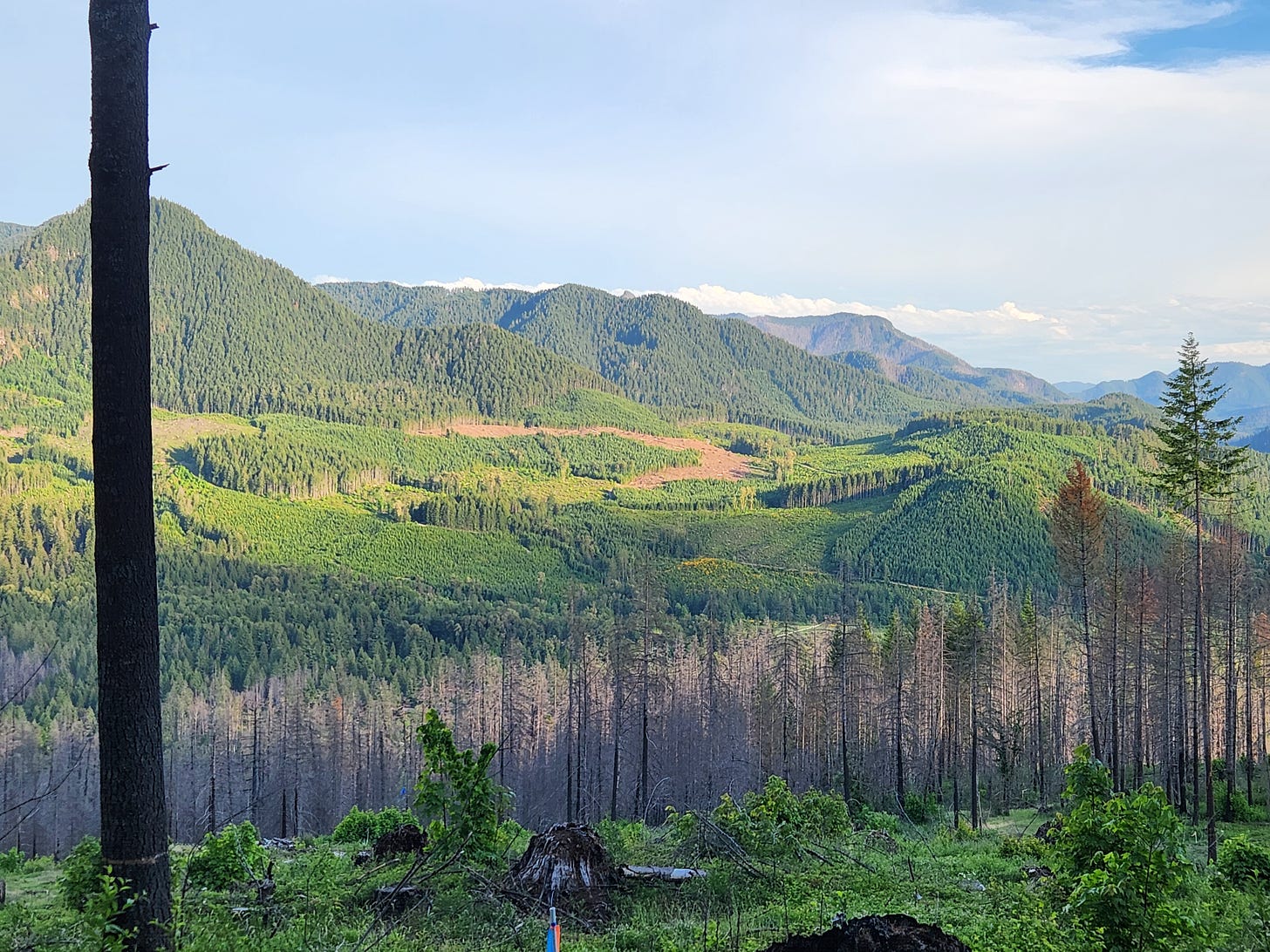
I live near the HJA. I recently received their email detailing the state of affairs currently. It's heartbreaking, true, but I suppose some good data on fire behavior will come out of it. Our megafires of recent years do hurt, especially when they run through old growth. Of course, they wouldn't be so disturbing if we didn't feel that we were losing the last bits of our old growth, our last never-logged forests. They are both--the megafires and the sense of loss--the nasty sequelae of a century of rampant PNW logging that left us with somewhere around 10% of the pre-colonial old growth acreage. Talk about rapid ecological shift. Thanks for this. Lots to think about here.
I'm glad to read ppl like yourself are thinking more deeply about the rapid rate of change that is underway, increasingly in western NAmerica ushered in by fire. The loss of old forests like HJA and many others that will not be coming back in generations (if ever) is something most do not care about or are willing to contemplate. One can attempt to "think lke a forest" and see this as another change, but in the larger scheme of things, it's actually much more distressing -- entire ecosystems and landscapes are being pushed into the unknown, and taking us with them. I think many ppl, if they're honest, can feel this happening.